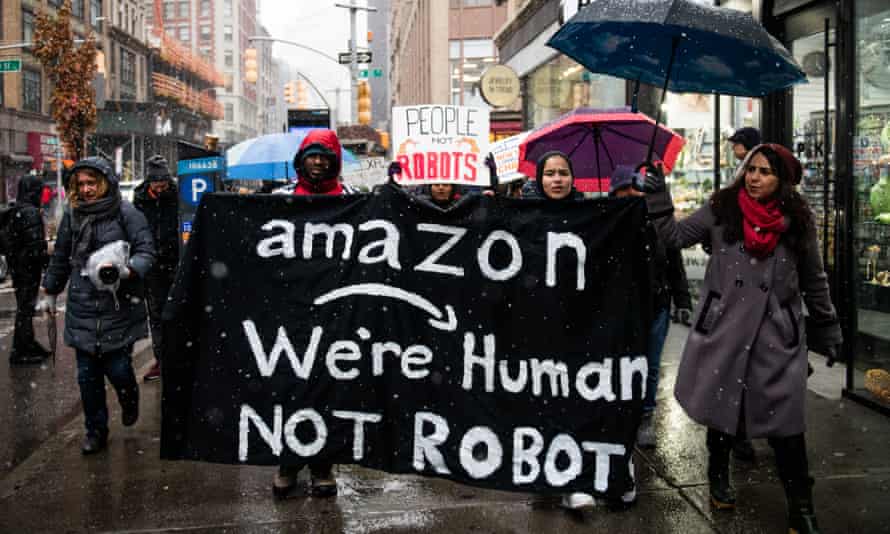Jessa Crispin
The film doesn’t glamorize life at an Amazon warehouse. But it’s undeniably useful to the corporation to have a prestigious film to give political cover
 ‘
‘Amazon is putting cameras in the trucks of its delivery drivers, monitors on the bodies of its warehouse workers, and security cameras both inside and outside its facilities.’ Photograph: Bloomberg/Getty Images
Tue 23 Mar 2021
The new movie Nomadland may have received six nominations for the Academy Awards this year, but it’s also been met with its fair share of controversy. Telling the story of Fern (played by Frances McDormand), a woman who lives an itinerant life, moving from state to state to follow work, sleeping in her van modified into cramped living quarters, the depiction is, some critics say, too cheery. She lives this life because she chooses to, hitting the road after a tragedy, not because she has to. And the work she does supports her lifestyle and she wants for nothing more.
Comfort food: the Oscars nominations are not nearly as radical as they think they are
Peter Bradshaw
Nomadland shows Fern working in an Amazon warehouse; the makers of the film received permission from Amazon to film on location. The work that Fern does looks tedious and difficult, but let’s just say there are no labor violations shown on screen. Fern does this menial labor to remain true to herself and the life she wants to lead, and Amazon essentially funds her authenticity.
Advertisement
Meanwhile, in the real world, Amazon is putting cameras in the trucks of its delivery drivers, monitors on the bodies of its warehouse workers, and security cameras inside and outside its facilities. It creates heat maps to detect if too many employees are gathering in the same place at the same time to discourage both fraternization and discussions of forming a union. And the company touts all of this, as effective methods for boosting productivity and profit margins.
The horrors of working at Amazon warehouse facilities have been circulating for some time. Employees, not granted long enough bathroom breaks that allow them to travel all the way from their position to the facilities and back, have reported peeing in bottles. They have said they are sometimes forced to stand in line after work for security screenings to make sure no one is smuggling out product, time they are not compensated for. Warehouses are often not temperature controlled, meaning employees have to work in sweltering conditions in the summer and in cold temperatures in the winter.
POST MODERN TAYLORISM
But the increased surveillance is a new level of indignity. The pandemic has increased the volume of packages being handled by Amazon delivery drivers, in some regions doubling their workload. Workers have complained about having to work at backbreaking speeds to meet their quotas, about injuries and exhaustion. These workers are often contractors, meaning they are working without the protections or benefits that come with full-time employment.
Instead of giving their overloaded workers a pay raise to match the increased labor, or hiring them full-time so they can receive health insurance to cover their repetitive strain injuries, Amazon has responded by putting cameras in the delivery vans to carefully monitor performance. The cameras attach to the ceiling of the van, with one lens pointed directly at the driver’s face. Now if a driver cuts corners in order to meet their impossible quotas for the day – running a stop sign here, peeing in a bottle to avoid having to stop to find a public restroom there – it will be reported immediately to Amazon headquarters. Even things like U-turns, braking too quickly, and other minor traffic issues are automatically reported without notifying the driver. Human beings are being expected to reach the performance levels of machines, and to go without basic human needs like food, bathroom breaks, sleep and leisure time.
Human beings are being expected to reach the performance levels of machines, and to go without basic human needs
Amazon trots out the usual answers when questioned about the increased monitoring: they are concerned with safety and fulfillment. They have delivery promises to keep, as their Prime customers expect their orders to magically appear on their doorsteps the day after, or even hours later, their orders are made. It’s about customer satisfaction and keeping the streets safe. (It’s not clear how Amazon’s failed plan to spy on its employees’ social media presence, including communications and posts made off hours, was about customer satisfaction, but I’m sure they will figure out a way to explain it eventually.)
We can debate whether Nomadland deserves the criticism it is receiving – it is, after all, a fictional film and not a documentary about the labor conditions of the working class. But it’s undeniably useful to Amazon right now to have a prestigious film providing cover for its abuses. Then again, the working conditions of its employees and contract workers have been well-known and reported for years, but the company keeps increasing its market share. Amazon doubled its profit during the pandemic, and the gap in pay between its executives and its warehouse workers continues to grow. Also the company doesn’t pay taxes. Amazon’s founder and chief executive, Jeff Bezos, saw his personal net worth grow a staggering $75bn in 2020.
Amazon can get away with it because there is an underclass of insecure workers who rely on even this underpaid, dangerous work to make ends meet. It’s not the narrative failures of one film, or even the moral failings of one CEO, that got us here; it’s the inevitable result of a society which wants to squeeze every dollar and every hour of productivity out of human beings to benefit the few. Each worker who gets fired because they ran one too many stop signs can easily be replaced by another desperate soul.
Jessa Crispin is a Guardian US columnist
No comments:
Post a Comment